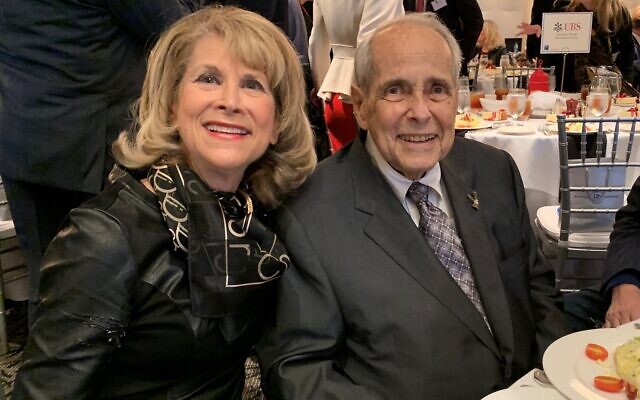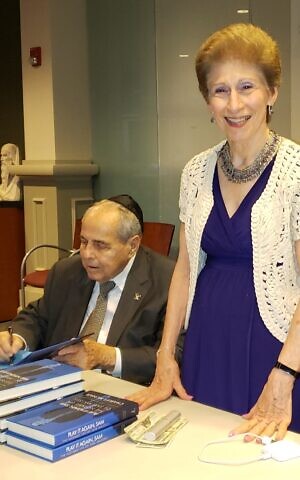The Lighter Side of the Late Sam Massell (z”l)
Marcia Jaffe recalls the former mayor's affinity for the lighter side of things.
After 37 years with the Atlanta Journal-Constitution and now with the AJT, , Jaffe’s focus is lifestyle, art, dining, fashion, and community events with emphasis on Jewish movers and shakers.

The recent death of Sam Massell brought back memories of my half century-long relationship with him. National and local newspapers reported on the former mayor’s many accomplishments, but the Atlanta Jewish Times revealed his assessments of himself, his home, as well as his fun side.
As evidenced by his 1973 appearance at the Omni Hotel alongside comedian Flip Wilson — who was dressed as his female alter-ego, Geraldine — Massell had an affinity for the lighter side. He was free with very respectful comments for attractive women, relating once that Dorothy Lamour was his real crush until he realized that Atlanta had just as many attractive women.
I met Massell in the early 1970s in the elevator at the Atlanta Journal-Constitution. Throughout the decades, he mentored me as a Vice President of the Buckhead Business Association (where he was president before the Buckhead Coalition). I also served alongside his son, Steve Massell (2001 BBA president) and managed Buckhead City Life (1979), in which Sam took a keen interest. We posed for dozens of photos at every possible event. When I sang “You Make Me Feel So Young,” he would echo, “Standing by you, I look young.” When politics got divisive, we agreed to share a column in the AJT in which he’d take one side, and I’d take the other: “He Said, She Said.” Sam was eager to do it, but we never picked a topic.
In 2016, Massell invited the AJT into his home for an intimate and sentimental tour of the things he treasured — mostly his late wife, Doris’s, artwork and memorabilia, along with a basketball signed by Hawks star “Pistol” Pete Maravich at the opening of the Omni in 1972. In 2018, he agreed to a light-hearted Lowdown interview with some spicy off-the-cuff remarks. One was his admission that his guilty pleasure was “sex, but people don’t like to talk about it. Never have gotten over calories in ice cream, not any calories in sex though.”

Another glimpse of Massell comes from Gail Solomon, who was his personal assistant for three years, until his retirement. “Sam’s most memorable lesson required that I always use a title (Mr., Mrs.) when addressing a letter,” she recalled, “explaining that people be treated equally, that there was a time when certain people weren’t allowed to have a title.” Solomon recalls that, during elections, almost every candidate running for office would come to meet with Sam and get his advice. He took every call.
When Massell’s biography “Play It Again, Sam” was published, Solomon invited him to speak at Ahavath Achim Synagogue. Extra chairs had to be set up to accommodate the crowd. Massell was delighted to be sought after, and it was just like him to stay long after the program to take questions.
The following are some excerpts from those interviews. As you can tell, I was not afraid to ask the “unaskable.”
AJT: Tom Wolfe’s Book about Atlanta, “Man in Full” — were you one of the characters?
Massell: I know Wolfe is a good writer, but I was disappointed in the book, as I thought it was going to be a favorable report on Buckhead’s real estate success stories. As such, in fact, I invited him to be the keynoter at the Coalition’s Annual Meeting (where I would have distributed copies). When I discovered it was a negative treatise, I withdrew the invitation. I didn’t see me in the book, but there were several Coalition members who had personalities similar to his characters.
AJT: What are your early recollections of Jewish Atlanta in the 1930s?
Massell: The Jewish population was very small, but we were homogeneous: Reform members of The Temple and the Standard Club (then on Ponce de Leon). We weren’t invited into membership into social clubs, so we had our own, “Top Hat” for boys and “Lucky 13” for girls.
AJT: As mayor, what do you consider your acme and low point?
Massell: The fact that the MARTA referendum, promulgated by my predecessor, Ivan Allen, had failed and I was able to successfully restructure the funding (sales tax and subsidized fare) … we became the envy of urban America. Then, appointing the first woman to the City Council in Atlanta’s 125-year history was a breakthrough for minorities. My most everlasting effect was my responsibility to steer Atlanta through the peaceful transformation from an all-white power structure to a Black city government. My low point was appointing a police chief who did not get along with the African American community.
AJT: If you could have another talent …
Massell: Playing snare drums. I got kicked out of the band in high school.
AJT: The best advice I gave my kids …
Massell: “Two heads are better than one, even if one is a cabbage head,” which was told to me by my grandfather Sol Rubin.
AJT: If they made a movie of my life, I would choose … to play the lead.
Massell: Martin Sheen knows how to play a politician and has charisma.
AJT: My wife would say I am too …
Massell: My Jewish genes push me into “help mode” all the time, even when not needed.
AJT: My favorite cocktail …
Massell: Chopin vodka martini, olive on the side … hard to come by. Purely deluxe.
AJT: Looking back, the best real estate deal I ever did was …
Massell: Selling a dead tree for $10,000 to an outdoor sign company where the Sheppard Center is now. They paid me instead of me paying them.



comments